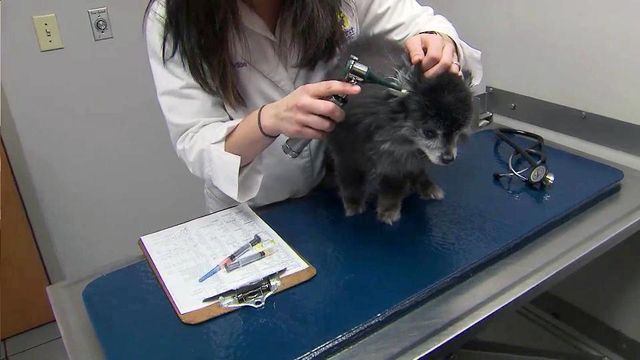Fight 'super fleas' with consistent treatment, vets say
Some pet owners say they're dealing with what they call "super fleas," insects that have become resistant to treatment methods.
Posted — UpdatedYour browser doesn't support HTML5 video.
Owner Susan Everett made the decision early to put Smokey on monthly medication to prevent fleas, and she said neither Smokey nor her cat has ever had a flea problem.
“It's good preventive maintenance,” she said. “I think of it like my car, like my own health.”
Everett and her pets may be among the lucky ones. Some pet owners say they're dealing with what they call "super fleas," insects that have become resistant to treatment methods.
Smokey's veterinarian, Dr. Lisa Mendise, says there's a simpler explanation.
Your browser doesn't support HTML5 video.
“A lot of things that people are saying are 'super fleas' or flea resistance are mainly people who aren't using their prevention through wintertime.”
She said fleas don't go away in cold weather, and pet owners should use prevention products year-round.
Wes Watson, an entomologist at North Carolina State University, said modern flea prevention generally works when it's used properly. But insects do develop resistance.
“Biology's going to win eventually,” he said. “We just change products and do a patch that works for a while.”
Bayer, the company that makes Advantage and K9 Advantix flea treatments, said eight years of study and sampling that concluded in 2010 showed no evidence of resistance to the chemical used in the products.
A spokeswoman said the data is being updated for release later this year, and she said the company acknowledges that mild winters have extended flea and tick season across the country.
"The normal seasonal cycle of tick and flea pressure is no longer as visible; it now seems to be a constant pressure year-round," Bayer's Lauren Dorsch said.
Finding the best flea prevention for your pet might take some trial and error, but Mendise says it's the best solution to keep the pests off your pet and out of your home.
“I say stay on the prevention, give it once a month,” she said. “Whatever prevention you feel is working for you, stay on that one.”
• Credits
Copyright 2024 by Capitol Broadcasting Company. All rights reserved. This material may not be published, broadcast, rewritten or redistributed.
